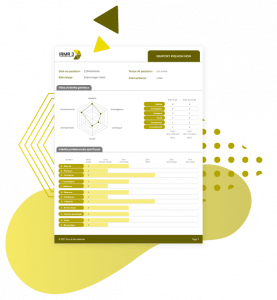RIASEC tests are a cornerstone in the arsenal of professional assessment tools, providing human resources professionals and psychologists with an accurate and reliable method for assessing individuals’ interests and preferences.
These tests, based on the model developed by John L. Holland, align individuals’ professional aspirations with organizational needs, thus facilitating effective and strategic skills management.
Designed to assess professional interests and personality preferences, these tests provide valuable insights to guide individuals towards careers that match their natural inclinations.
What is the RIASEC model?
The RIASEC model divides professional interests into six main categories: Realistic, Investigative, Artistic, Social, Enterprising, and Conventional.
Each category is associated with specific activities and key skills, allowing for the identification of individuals’ professional preferences.
For professionals in human resources and psychology, this classification serves as a guide to assess how an individual’s preferences align with different roles and sectors, thereby optimizing career support.”
Why use a RIASEC test?
RIASEC tests help identify professional preferences and personality types, thereby facilitating the decision-making process in career planning and recruitment.
By identifying dominant interest profiles, professionals can better understand the intrinsic motivations of employees, promoting more informed decisions regarding professional development, training, and internal mobility.
The use of these tests contributes to greater job satisfaction, increased productivity, and reduced turnover rates by placing individuals in environments where they can naturally excel.
Application of RIASEC Tests in Recruitment and Professional Development
For Recruitment: HR professionals can use RIASEC tests to align candidates with roles that match their intrinsic interests, thereby increasing job satisfaction and retention. For example, a candidate with a strong Realistic interest might excel in technical or hands-on roles.
For Professional Development: RIASEC tests help identify potential career paths and professional developments for employees based on their personality types. An employee with an Investigative profile could be guided towards research and development roles.
How do RIASEC tests work?
The RIASEC test administration process is structured around a series of questions that assess interest in a variety of professional activities.
The responses provided are analyzed to determine the individual’s dominant interest areas, revealing a profile that reflects their natural skills and preferences.
For professionals, this information is crucial for developing personalized development plans, identifying growth opportunities, and advising individuals on potential career paths.
Interpreting the Results of RIASEC Tests
Interpreting the results of RIASEC tests goes beyond merely identifying the dominant interest profile.
It involves a detailed analysis of how the different interest categories interact with each other, providing an overview of an individual’s professional preferences and inclinations.
This in-depth understanding assists professionals in formulating tailored recommendations for career development, suggesting specific roles, areas of training, and professional advancement strategies that align with the employee’s preferences and aspirations.
Using RIASEC Test Results for Professional Development
The application of RIASEC test results in professional development is varied and impactful.
It enables the design of targeted training programs, planning of enriching career paths, and implementation of skill management strategies aligned with the organization’s long-term goals.
By leveraging the insights provided by RIASEC tests, professionals can facilitate an optimal match between employees and their roles, thereby maximizing human potential and contributing to the overall success of the organization.
Tips for Interpreting RIASEC Test Results
The interpretation of the results must be contextualized; it is essential to consider the individual as a whole, taking into account their skills, experiences, and aspirations.
The results of the RIASEC tests do not define the limits of an individual’s abilities, but rather offer perspectives on the work environments in which they might thrive the most.
FAQ
- Are RIASEC tests suitable for all ages? Yes, they can be used by teenagers for career exploration as well as by adults considering a career change or progression.
- How can HR professionals integrate RIASEC tests into their processes? They can be used during initial assessments, job interviews, or for continuous professional development.
- How to integrate RIASEC tests into an existing recruitment process? Start by using them as a complementary tool to assess cultural and professional fit.
- Can RIASEC tests be used for leadership positions? Absolutely. The results can shed light on natural leadership styles and how an individual may guide a team.
- What is the validity of RIASEC tests? Numerous studies support the reliability and validity of RIASEC tests, positioning them as a valuable tool for assessing career interests.
Conclusion
Integrating RIASEC tests into competency management practices represents an evidence-based approach to optimizing human potential within organizations.
By providing a nuanced understanding of career preferences and interests, these tests allow HR professionals and psychologists to promote aligned and intentional career development, thereby enhancing organizational effectiveness and employee job satisfaction.

